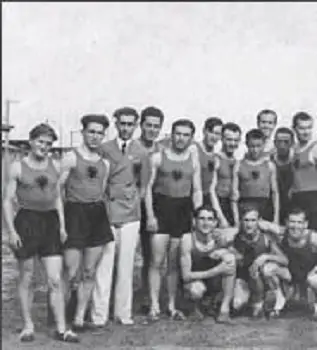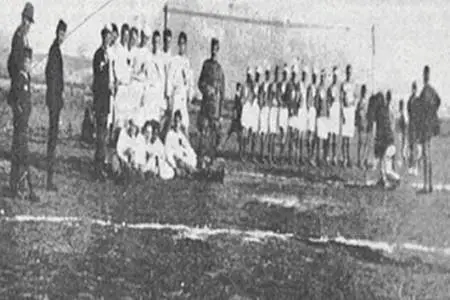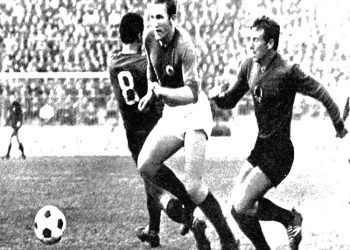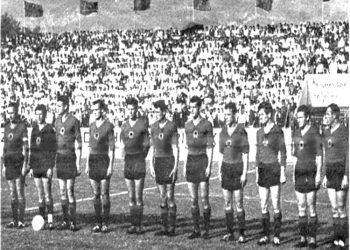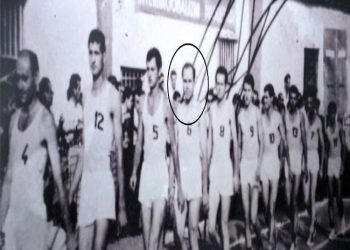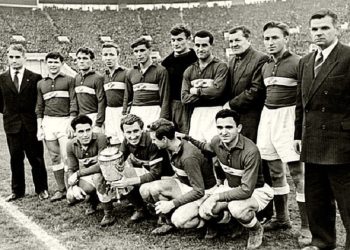By Dr. Iljaz Gogaj
– Why did the great gym teacher, who was born in exile, return to Albania and what requirements did he have for the students to revive a new tradition in Albanian sports?!-
Memorie.al / With special quality physical skills, graceful in portrait and imposing with an athletic body, which resembled the sculptures of ancient art, theoretically and practically prepared in a renowned European school for physical culture and sports, with a general culture of accomplished and with noble behavior, Gaqo Gogo, constitutes an image of the pedagogue, athlete and Albanian citizen of the 30s of the 20th century. The son of a simple family, he was born on January 21, 1908 in Odesa (Ukraine). There, in exile, Albanian families preserve, cultivate and keep Albanianism alive. Therefore, after the Declaration of Independence, he returned to Albania to share the good and the bad with his compatriots and to lend a hand to the homeland towards recovery, progress and prosperity.
There was a time when, as Gaqo Gogo would write later, when “it seemed as if the whole country was suffering from an illness that could never be cured… but an immortal virtue of the Albanian, his nobility, convinced us of the depth of in the soul where a mysterious power was hidden and asleep. It was therefore a belief in the arboreal gene, which made the exiled Albanians never lose their faith and return to melt their lives in the lands of their ancestors”.
In the academic year 1929-’30, Gaqo Gogo successfully completed the high school of Physical Education and Sports in Berlin (Germany). He was the only Albanian in that institution. On November 1, 1930, he started working as a physical education teacher. At first at the Korça National High School, later at the Tirana gymnasium, then at the Shkodra gymnasium, and then again at the Tirana gymnasium, successfully teaching gymnastics for about 14-15 years.
With the complete serious preparation in a German school, with the many inclinations for sports and the zeal for work, he achieved very good results and opened new paths, laying the foundations of a tradition for further developments in the field of sports and physical culture in Albania.
He was very serious and rigorously demanding in the lessons and did not “melt” with the students before, but with the exact knowledge of each one, with their psycho-pedagogical treatment, strictly according to merit, with his well-known correctness “German goddess” and on top of that all with his versatile personal example, he was always loved and respected by students and colleagues. Gaqo Gogo’s seriousness was graceful. It stemmed from noble and human behavior, Professor Gaqo Gogo, never insulted or humiliated students.
With his exacting demands of professional heights, master Gaqo Gogo never went against the human nature of the student, but kept to the load and physical qualities of each of them. He was so skilled, trained in “professional” secrets, that even for every movement he knew the physiological, anatomical, as well as psychological effect. He knew well the theoretical side of movements, according to age characteristics.
Relations with students
He knew how to find the reason why this or that student could not do this or that exercise, how the body should be held to be able to easily and accurately perform the various body movements. For the strongest and most physically capable students, he scaled the load and with his patient and tireless work, supported scientifically, he paved the way for them to always move forward.
In the high school of Tirana, with the best students, he had created a group of athletes baptized “iron body”. This group became a powerful incentive for high performance, because quite a few students wanted to participate in that formation. All the more so that the “iron body” was encouraged with some rights. He would be at the head of every parade and was in charge of building the complex exercises and the most difficult, but also the most beautiful figures in the gymnastic-sports events.
The group had the right to go out in formation in sports uniform while singing. Thus, the “iron body” became the evidence of the fruitful work performed by the skilled teacher Gaqo Gogo, for the benefit of improving the health and physical beauty of the students. At the same time, directly or indirectly, it made a significant impact on the emancipation of Albanian social life, at a time that always required improvements.
Although he was worried about the health condition of some students, clumsiness or any physical defect, he did not strain them and did not suppress them beyond their capabilities, but patiently gave them the load according to their ability and at the same time, let them free to practice sports according to inclination and desire.
Since the high school in Tirana, at the time when he started working there, Gaqo Gogo, did not have a gym, on days with bad weather, with rain and wind, he kept the students in the classroom giving them various conversations about physical education problems and morality. His knowledge of literature and especially history made the conversations interesting.
Above all, he knew how to talk to students about love for the country. He told them to be proud that their homeland was small, but with a great history. This work of the patriotic teacher always increased the prestige of Gaqo Gogo in the eyes of the students and in the entire citizen opinion of the country.
In order to make the physical culture program as complete as possible, a gym was also needed, so with persistent efforts he managed to secure a relatively large room in the gymnasium where he created a gym. With the financial aid collected from the students, the fund, known at that time as the “student’s allowance” and a little from his own pocket, managed to equip the “gym” with some gymnastic equipment.
The lesson took place in difficult conditions, almost half of the students were waiting for their turn, because the gymnasium was not open, but the dedicated teacher never gave up and never backed down from difficulties. He always worked with optimism. Persistent and energetic as he was, he was able to provide showers at the school, for washing after training. He had well instilled the rules of hygiene in the students.
Talent
Gaqo Gogo, is the first Albanian physical education teacher in the capital who, in order to rhythmically observe the dynamics of the physical development of each student, began to measure physical qualities, a work supported by scientific foundations. The data that was recorded within two years (1931-1936) gave enviable conclusions for the time.
In the school year 1932-1933, there were few students who could finish the 3000 m running race. Even those who finished it did it for about 17 minutes. And after two years, at the end of the 1935-1936 school years, the average time of each class collectively was 14 minutes.
In addition, within nine months of the beginning of the observations, the chest circumference increased on average for all students to 4.2 cm. With these data, which were published in the press of the time, Gaqo Gogo laid the foundations of comparative experimental physical education in Albania.
The knowledge of human anatomy and physiology had made Gaqo Gogo to, from time to time; perform the role of a doctor. It is known that his father, Nisi, had suffered from paralysis and Gaqo, with the help of professional massage, had raised him on his feet and made him able to work.
As his students testify and from various articles in the press of the time, Gaqo Gogo, had raised the lesson of physical culture and the organization of sports activities and games to an art.
The various parades of the students and especially the traditional gymnastics-sports manifestations at the end of the school year were indicators of how Gaqo Gogo tirelessly poured all his energy and skills, giving the proportions of real parties that the students, teachers and spectators made for themselves. Many of the capital.
Triggered by such a manifestation and by the results published by Gaqo Gogo as a physical education teacher, the journalist Nebil Çika would appreciate his work, when he would write in the press of the time: “Gaqo Gogo, showed a design in the field of ‘Shallvares’, which means true skill. It proved to us that with such skill, with will and effort, things can be done which for today’s Albania can be called miracles”.
Continuing to try to give us a profile of Gogo’s personality, Chika adds: “Gago Gogo, I repeat, forms an exception in the well-known ‘society’ of Deutsche culture, not only has a truly deeply German upbringing, but also the passion to work for the creation of a new Albania, for the creation of types worthy of being presented to the young Albanians, i.e., with modern Kryepku culture, with a high consciousness of the civic mission…”!
And to better complete the figure of Gaqo Gogo, he will add: “Gaqo Gogo is an idealist. He has will and passion that give him skill and dynamism. He doesn’t think about fat salaries, he doesn’t think about good clothes, food he drinks zengin, he doesn’t think about sleeping in a soft bed…! He thinks about how to increase his physical skills; he is devoted to this work with flesh and soul… Albania will become beautiful, strong and happy from such elements” .
Work
In his successful work as a teacher of education and physical preparation of students, the important fact that he himself, with excellent physical data, was an all-round sportsman, would give way. He was an athlete, a high school student and enjoyed playing handball and basketball. In fact, he made handball popular for the first time in the high school of Tirana and beyond. In ball games, he did not prefer football.
He played tennis elegantly at the “Nallbani” club in Tirana and it was a pleasure to watch him ride his horse through the fields and hills around Tirana. He swam beautifully in several styles and shone with elegance in the ring as a wrestler and boxer. Above all, he had knowledge of athletics and practiced it in every season. There was no atmospheric agent to prevent Gaqo Gogo from running.
He regularly practiced all types of running, from the classic pure sprint to pole vaulting. He was the champion and record holder of the time in the decathlon, a record which was broken after the war in 1953. According to the oral records of his contemporaries, he successfully participated in several Balkan Olympics. From the written and published data of the time, it appears that in the Sofia Olympics (1934), he participated in the decathlon, where he came first in the 1500 m run and seventh at the end of all disciplines of the decathlon.
He aimed for more, not only for himself as an athlete, but for all Albanian athletes, when in July 1936, he was attending the World Olympics in Berlin, he felt pain that Albania could not be represented with a team. But still, he had not lost hope when he would declare in an interview given to the press after returning from Berlin: “… we have the spirit of the match, but we need a strong will and sweat to continue to the end the work engaged with of sport to reach the goal as Olympic representative”.
In addition to his work as a teacher and sportsman, with his thorough and sound theoretical preparation, obtained in his diligent studies and his wide interests that went beyond the school yard, Gaqo Gogo gave a visible contribution to the writings of different in the press of the time and at the same time with special brochures and books.
In his writings, we can see both the broad culture and the professional concern for the old methods in teaching gymnastics at school and for the prejudices that did not give the sport its deserved place in the social and cultural development of the people.
Patriot
The learned and talented teacher, Gaqo Gogo, came out openly and firmly against the military methods of command in physical culture, which had prehistoric origins as he testified, from the Chinese Tang-Fu, 1000 years before Christ, followed in modern times by the Swedish priest Ling (1776-1839) and in Albania, they were introduced by Italian officers.
According to the advanced principles, from which Gogoja was guided, the student’s movements in physical education should be done with pleasure and by each one, according to the natural data of the organization and in accordance with his physical powers.
The command, according to him, led to the loss of the original character and individual value of the movements that forced the students to make automatic movements, which not only lacked physical efficiency and psychic value, but also led to damage to the personality of the exerciser. After all, it drew his attention; they went against the vitality of our race.
Therefore, the requests of the teacher Gaqo Gogo, would go far, when he would request that a national gymnastics controlled and supplemented by technical experiments of the physical culture of the time be created in Albania.
“We don’t need to form groups in schools and barracks for demonstrations and parades,” Gogoja emphasized, but we need to form Albanians with manly characteristics that reflect resourcefulness, patience, will and dynamism.
Gaqo Gogo came out emphatically and strictly against the norms of attitude and behavior of many teachers, which harmed the progress of the teaching process and the student’s personality.
Therefore he would write in the press: “The orders ‘don’t laugh’ ‘don’t call’, ‘don’t scream’ and some innocent games and commands must disappear” with a strong coat and collar.
Armed with the great teaching of Pestalozzi that the school deals with the development of the body with the same care as it deals with the development of the mind and the soul, Gaqo Gogo demanded the reformation of gymnastics programs in Albanian schools. In primary schools, he noted, the teacher did not look at the development of the young body. They gave heavy exercises, and such that were neither interesting nor beneficial.
At the same time, to improve the work in this field, he would present the need for specialized teachers, but also special inspectors for physical education in the prefectures. In general, with culture and a broad horizon, he presented scientific arguments and made complete analyzes about the important role played by sports in the development of the character of young people.
In the service of the widest possible propaganda of physical culture, in addition to many articles in newspapers and magazines, he also published two brochures, in 1935 “I exercise every morning” and in 1936, “Gymnastics”. In them, the elementary norms and the daily program are given for anyone who wanted to practice morning gymnastics. Later in 1938, Gaqo Gogo would raise the publishing activity to a high level.
On the basis of the historical data he collected, he wrote the book “Establishment of a Kingdom, Bird I and His People”. He wrote a book where, despite his university studies in the field of sports and physical education, he gave proof of his ability as a ruler and designer in the field of sociology and history.
During the fascist occupation, Albanian teachers were in the vanguard of resistance. Albanian schools, inspired by the numerous works of the best teachers, became the first nurseries of the war for the liberation of the country. Gaqo Gogoja is one of the most active educators of resistance and direct opposition to the Italian organizers.
He did not accept their brutal intervention to spread fascist ideas and practices in the school, especially in physical education and sports activities with the various youth groups. At first, as a punishment measure, he was transferred to Shkodër. Even there, he did not line up his activity in defense of Albanianism at school. Then Gaqo Gogoja was interned with many other teachers in concentration camps in Italy.
After the war, Gaqo Gogo spent his life in exile and closed his eyes in foreign countries, always worried about the fate of his homeland under the dictatorship. Memorie.al




